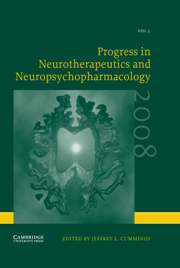No CrossRef data available.
Article contents
New Approaches to Treatment of Schizophrenia by Enhancing N-methyl-d-aspartate Neurotransmission
Published online by Cambridge University Press: 22 May 2007
Extract
ABSTRACT
Background: There is a great need to develop new antipsychotic agents. In addition to dopaminergic neurotransmission, glutamatergic neurotransmission has been implicated in the pathophysiology of schizophrenia. The most compelling link between glutamatergic N-methyl-d-aspartate (NMDA) neurotransmission and schizophrenia concerns the mechanism of action of the psychotomimetic drug phencyclidine and the dissociative anesthetic, ketamine; both are NMDA antagonists. The psychosis induced by the NMDA antagonists causes not only positive symptoms similar to the action of dopaminergic enhancers but also negative symptoms and cognitive deficits typical of schizophrenia in normal volunteers and worsening of the psychotic symptoms in patients with schizophrenia. Accordingly, enhancing NMDA neurotransmission should benefit the symptoms of schizophrenia. Methods: Most clinical trials were done by the addition of the NMDA-enhancing agents, glycine, d-serine, d-alanine, d-cycloserine and sarcosine to the stable regimens of antipsychotics in double-blind, placebo-controlled designs. Results: When taken together, the trials of NMDA-enhancing agents in patients with chronic schizophrenia receiving stable dose of antipsychotics, the NMDA-enhancing agents were effective in the domains of negative symptoms, cognition, depression, positive symptoms and general psychopathology. The agents also significantly improved extrapyramidal symptoms. No significant side-effects or safety concerns emerged. Interpretation: In addition to testing more lead compounds, dose-finding and long-term trials are required to determine the optimal dose and functional improvement capacity of NMDA receptor agonist. The agents may also be applied to prevention and the treatment for prodromal phases of the illness.
- Type
- Research Article
- Information
- Progress in Neurotherapeutics and Neuropsychopharmacology , Volume 3 , Issue 1 , January 2008 , pp. 275 - 289
- Copyright
- © 2008 Cambridge University Press


